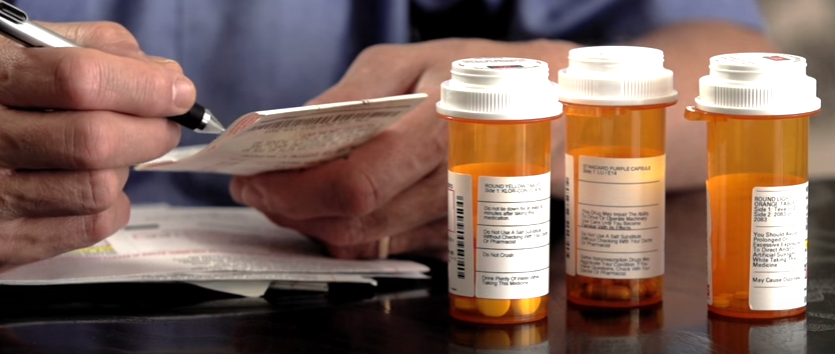Instead of finding the cause of symptoms, early diagnosis of psychosis just gets you put on meds more quickly
03/28/2018 / By Tracey Watson

Mental Health America describes psychosis as “a general term to describe a set of symptoms of mental illnesses that result in strange or bizarre thinking, perceptions (sight, sound), behaviors, and emotions. Psychosis is a brain-based condition that is made better or worse by environmental factors – like drug use and stress.”
This may seem like a distant or unusual disease to many of us, but it’s actually far more common than we may realize. The American Psychiatric Association estimates that one in 13 people will have a psychotic experience at some point in their lives before the age of 75.
Symptoms include hearing or seeing things that aren’t really there; paranoia about being watched; bizarre speech; unusual behavior; strange body positions; and extreme focus on or preoccupation with strange fears, among others.
Health officials estimate that people with schizophrenia and other psychotic disorders generally have a 15- to 20-year lower lifespan than other members of the population. A 2015 study published in the journal Schizophrenia Bulletin noted:
Our findings suggest that the mortality gap in people with psychotic disorders remains huge and may be wider for unnatural-cause mortality than previously reported.
Psychiatrists and other healthcare practitioners believe that early intervention is critical to the successful treatment of people with psychotic disorders. A recent study by researchers from the Lawson Health Research Institute, for example, found that specialized programs for early psychosis led to substantial reductions in mortality rates.
Mother Nature's micronutrient secret: Organic Broccoli Sprout Capsules now available, delivering 280mg of high-density nutrition, including the extraordinary "sulforaphane" and "glucosinolate" nutrients found only in cruciferous healing foods. Every lot laboratory tested. See availability here.
The study, which was published in The American Journal of Psychiatry, examined health outcomes for patients treated between 1997 and 2013 at the Prevention and Early Intervention Program for Psychoses (PEPP) at London Health Sciences Centre in Ontario, Canada. The research team found that when comparing patients enrolled in the PEPP program to patients who were not, those who took part in the program had a four-fold lower risk of mortality.
However, such patients had a higher risk of hospitalization overall, and increased their risk of drug-related illnesses and side effects. It is also important to note that after the initial three-year period post-treatment, most of the benefits experienced by patients in the PEPP program when compared to other patients fell away.
The truth is, the thinking that it is important to offer early drug-based treatment to patients with psychotic disorders contains an inherent danger: Jumping at the opportunity to medicate people who are exhibiting these types of symptoms means little or no effort is made to get to the actual cause of the problem. (Related: Living in cities makes people psychotic; they start hearing “voices in their heads,” shocking new study finds.)
For example, the side effects of antidepressant medications include many of the same “symptoms” as those listed for psychosis. Those trying to get off these types of medications also often experience serious withdrawal symptoms which can create similar “psychotic” symptoms. With the thinking that early drug intervention is important to treat those with psychosis, a person dealing with these side effects might be diagnosed as having a psychotic disorder and simply be put on even more dangerous chemical drugs to try to control the problem, compounding the issue even further. (Related: Find the help you need at Psychiatry.news.)
“All patients being treated with antidepressants for any indication should be monitored appropriately and observed closely for clinical worsening, suicidality, and unusual changes in behavior, especially during the initial few months of a course of drug therapy, or at times of dose changes, either increases or decreases,” noted world-renowned psychiatrist, Dr. Peter R. Breggin. “The following symptoms, anxiety, agitation, panic attacks, insomnia, irritability, hostility, aggressiveness, impulsivity, akathisia (psychomotor restlessness), hypomania, and mania, have been reported in adult and pediatric patients being treated with antidepressants for major depressive disorder as well as for other indications, both psychiatric and nonpsychiatric.”
The risks attached to taking antipsychotic medications are serious, including dramatically increased risk of suicide. These drugs have also been implicated time and again in mass shootings.
So, while early treatment for patients exhibiting symptoms of a psychotic disorder is no doubt beneficial, such treatment needs to be targeted at getting to and eliminating the root cause of the problem, rather than trying to medicate the symptoms away with dangerous antipsychotic drugs.
Learn more about the dangerous of psychiatric medications at Psychiatry.news.
Sources include:
Tagged Under: anti-psychotic drugs, Big Pharma, dangerous drugs, drug cartels, early treatment, psychiatric medications, psychiatry, psychosis, psychotic disorders




















